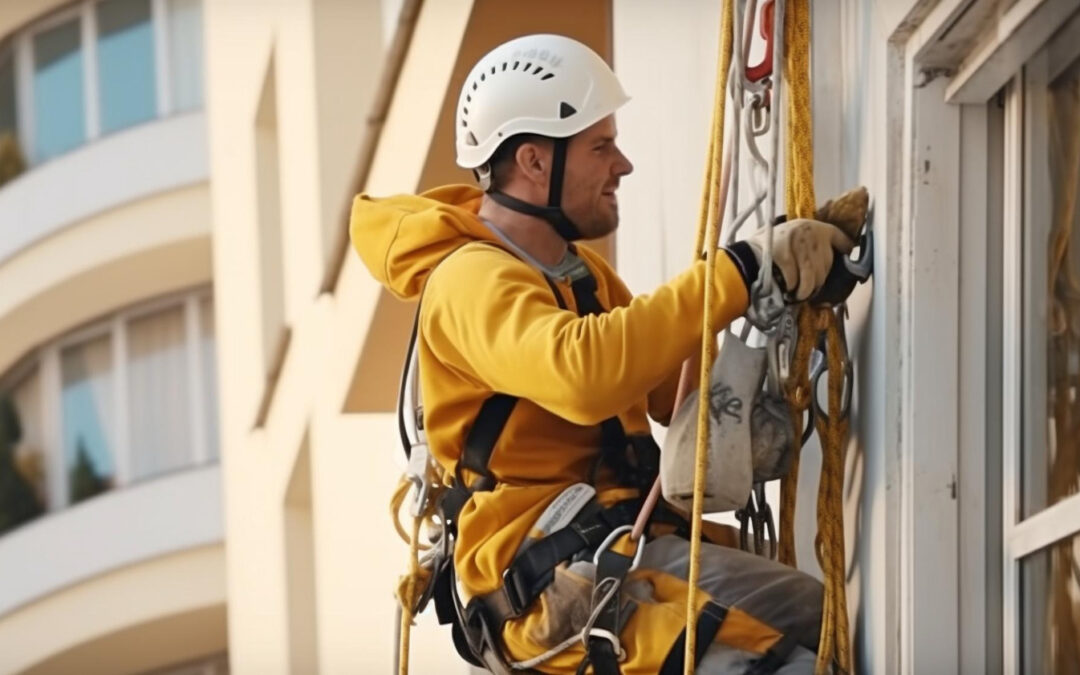Before starting rope access training, it’s important to check if you are physically and mentally ready, and if you’re okay with heights and small spaces.
If you like heights, enjoy adventure, and are hardworking, a job in rope access could be perfect for you. If you’re looking to enter the field of industrial rope access, you’ll need specialized training and certifications that prepare you to work safely and effectively at heights using ropes and associated equipment.
This guide looks at rope access training, including the skills you need, the chances available, and the challenges you might face.
It covers the basics and helps you understand how to advance in this career so you can make good choices about your future.
This training is essential for accessing difficult-to-reach locations in various industries. You may also want to read our previous post on what rope access technicians do.
Table of Contents

Who Should Consider Rope Access Training?
You should consider rope access training if you are:
- A construction worker seeking to expand your skills
- A maintenance professional looking to specialize in high-rise or complex structures
- An industrial cleaner aiming to access challenging areas
- Interested in careers in offshore industries
- An adventure enthusiast looking to turn your climbing skills into a profession
- A safety inspector needs to access various structures
Benefits of Taking a Rope Access Course
There are several compelling reasons for you to pursue rope access training:
- Career Advancement: It opens up new job opportunities for you in various industries.
- Safety Skills: You’ll learn crucial safety techniques for working at heights.
- Versatility: The skills you gain are applicable across multiple sectors and countries.
- Competitive Edge: You’ll acquire a unique skill set that sets you apart in the job market.
- Personal Development: It builds your confidence and problem-solving abilities.
Job Opportunities Across Continents
As a rope access technician, you’ll find demand for your skills globally. Having a rope access training and certification can launch you to a new height.
Here’s a brief overview of opportunities in different regions:
Nigeria
In Nigeria, you can find opportunities as a rope access technician in:
- Oil and gas industry maintenance
- Telecommunications infrastructure installation and maintenance
- Building facade cleaning and maintenance in growing urban centers
Other Continents
- Europe: • Offshore wind farm maintenance • Historical building restoration • Industrial plant inspections
- North America: • Skyscraper window cleaning and maintenance • Bridge inspection and repair • Geotechnical work in mountainous regions
- Asia: • High-rise construction in rapidly developing cities • Shipyard work • Theme park maintenance
- Australia: • Mining industry inspections and maintenance • Coastal infrastructure maintenance • Urban high-rise development projects
- South America: • Hydroelectric dam inspections • Eco-tourism infrastructure maintenance • Oil and gas industry work
Make the most of your offshore work with Global Providence Ltd. Our skilled rope access team offers top support to the oil and gas industry. We handle inspections, maintenance, and complex repairs safely and efficiently. Rely on us for your offshore needs. Get in touch today for a consultation (contact@globalprovidence).
Job Growth and Industry Trends
The rope access industry you’re considering entering has shown consistent growth over the past decade.
Key factors contributing to this growth include:
- Increasing urbanization and the construction of taller structures
- Growing focus on infrastructure maintenance and safety
- Expansion of renewable energy sectors, particularly wind power
- Cost-effectiveness of rope access compared to traditional access methods
Industry reports suggest a compound annual growth rate of around 7-8% for the rope access market globally.
This growth is expected to continue as industries recognize the efficiency and versatility of rope access techniques.
You can look at rope access jobs on indeed and other private websites.
Top Countries for Rope Access Jobs
The need for rope access workers changes around the world. Here are some top places with good job opportunities:
Europe
- United Kingdom: Many jobs in oil, gas, and construction.
- Norway: Lots of work in the oil and gas industry.
- Germany: Good prospects in industry and renewable energy, like wind turbines.
North America
- United States: Many jobs in construction, oil, gas, and wind energy.
- Canada: Steady demand in oil and gas and infrastructure.
Asia Pacific
- Australia: Lots of work in mining and construction.
- Singapore: Growing city with many infrastructure projects.
Middle East
- United Arab Emirates: Many jobs in construction and oil and gas.
- Qatar: Large infrastructure projects need skilled workers.
It’s essential to note that while these countries offer promising opportunities, job availability can fluctuate based on economic conditions and industry trends.

Skills Required for Rope Access Technicians
To succeed in this field, you’ll need to develop the following skills:
Hard Skills
- Proficiency in rope access techniques and equipment use
- Understanding of safety protocols and risk assessment
- Knowledge of relevant industry standards and regulations
- Basic maintenance and repair skills relevant to the specific industry
- First aid and rescue techniques
Soft Skills
- Attention to detail and safety consciousness
- Problem-solving and quick decision-making abilities
- Teamwork and communication skills
- Physical fitness and comfort with heights
- Adaptability to different work environments and conditions
Networking in the Rope Access Industry
For your career growth in rope access, networking is crucial. Some strategies you can use include:
- Joining professional associations like IRATA or SPRAT
- Attending industry conferences and trade shows
- Participating in online forums and social media groups dedicated to rope access
- Engaging in continuous education and advanced training courses
- Building relationships with colleagues and supervisors on job sites
Discover the Global Providence Ltd difference. Our full range of rope access services for the oil and gas industry is made to improve your operations. Whether it’s routine checks or complex tasks, we get outstanding results. Contact us to find out how our expertise can help your business.
Duration of Rope Access Courses
The duration of rope access courses you’ll need to take varies depending on the level and certification body. Typically:
- Level 1 (Technician): 5-day course
- Level 2 (Lead Technician): 5-day course (with prerequisites)
- Level 3 (Supervisor): 5-day course (with prerequisites) Each course usually concludes with a 1-day assessment.
Certification Difficulty
While the rope access certifications you’ll be pursuing are challenging, they are attainable with proper preparation and dedication. The difficulty increases with each level:
- Level 1: Focuses on basic techniques and safety procedures
- Level 2: Requires more advanced skills and some work experience
- Level 3: Demands comprehensive knowledge, extensive experience, and leadership skills The pass rates vary, but with thorough training and practice, you can successfully achieve certification.
Certification Levels and Career Progression
As you progress in your rope access career, you’ll typically follow a three-level certification structure:
- Level 1 (Rope Access Technician) • Entry-level position • You can perform basic rope access tasks under supervision • Career Opportunities: Assistant technician roles in various industries
- Level 2 (Rope Access Lead Technician) • Requires significant experience as a Level 1 technician • You can perform more complex tasks and assist in rigging and rescue operations • Career Opportunities: Lead technician roles, specialized industry positions
- Level 3 (Rope Access Supervisor) • Highest level of certification • You can supervise rope access projects and teams • Career Opportunities: Supervisor roles, project management, training instructor positions
As you progress through these levels, you may choose to specialize in specific industries or types of work, such as wind turbine maintenance, non-destructive testing, or geotechnical surveys.
Conclusion
By pursuing rope access training, you’re opening the door to a unique and rewarding career.
With growing demand across various industries and continents, including Nigeria, you’ll find excellent opportunities if you’re willing to invest in the necessary skills and certifications.
While the training and certifications can be challenging, you can achieve them with dedication and practice.
The versatility of rope access skills, combined with the right soft skills and networking, can lead you to a diverse and exciting career path in this dynamic field.


Recent Comments